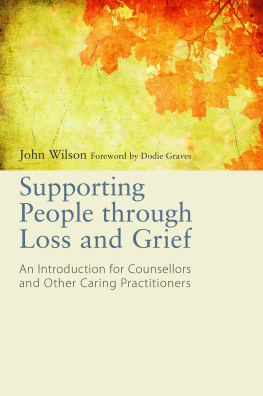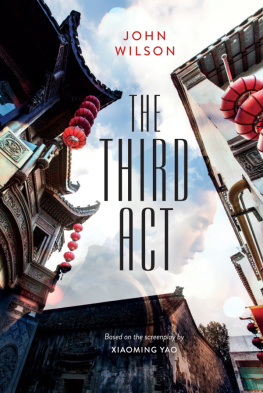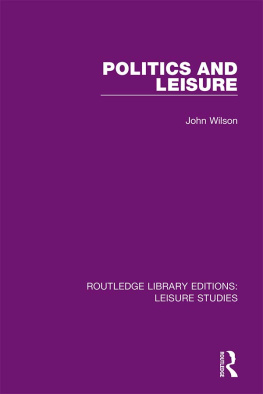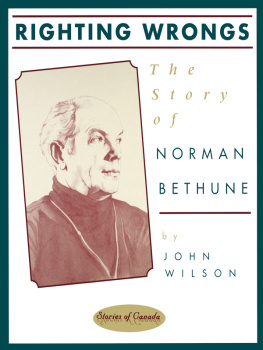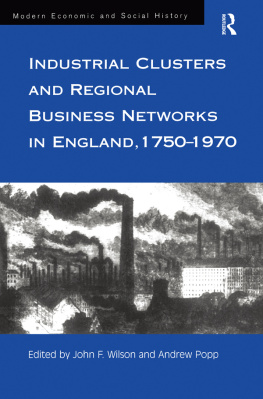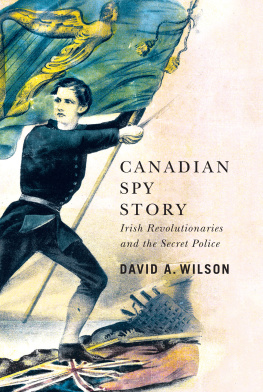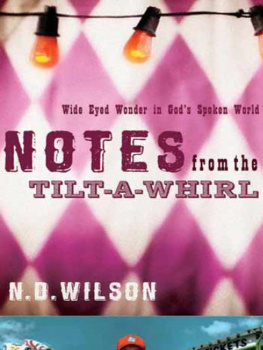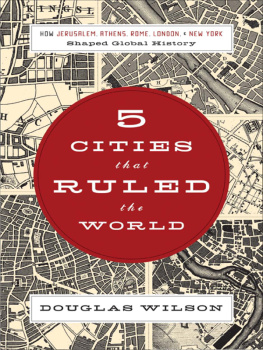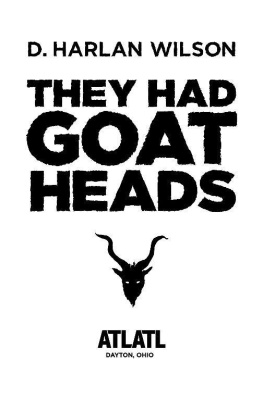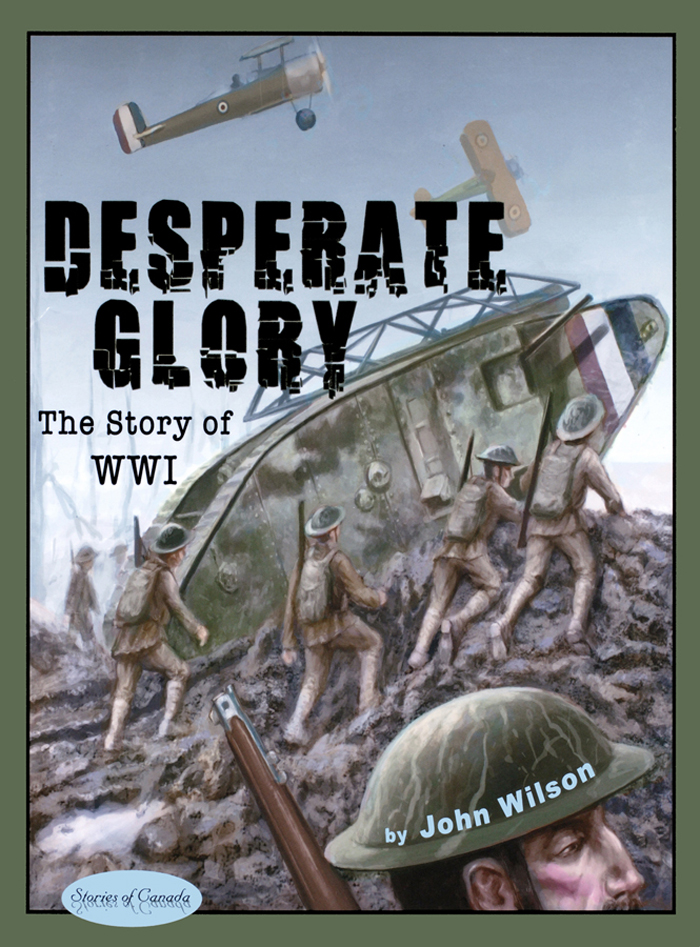Desperate Glory
The Story of World War I
Stories of Canada
Desperate Glory
The Story of World War I
by
John Wilson
Series Editor: Allister Thompson

Text copyright 2008 by John Wilson
Cover art by Christopher Chuckry
All rights in this book are reserved. No part of this publication may be
reproduced, stored in a retrieval system or transmitted, in any form
or by any means, digital, mechanical, photocopying or
otherwise, without the prior written consent of the publisher.
Napoleon Publishing
an imprint of Napoleon & Company
Toronto, Ontario, Canada
napoleonandcompany.com

Napoleon & Company acknowledges the support of the Canada Council
for our publishing program.
We acknowledge the financial support of
the Government of Canada through the Book Publishing Industry Development Program
(BPIDP) for our publishing activities.
Printed in Canada
Library and Archives Canada Cataloguing in Publication
Wilson, John (John Alexander), 1951
Desperate glory : the story of World War One / John Wilson.
Includes bibliographical references and index.
2nd printing September 2008
paperback ISBN 978-1-894917-81-0
1. World War, 1914-1918--Juvenile literature. 2. World War, 1914-1918--Canada--Juvenile literature. 3. Canada--History--1914-1918--Juvenile literature. 4. World War,--1914-1918--Pictorial works. 5. World War, 1914-1918--Canada--Pictorial works. 6. Canada--History--1914-1918Pictorial works. I. Title. II. Title: Story of World War One.
D522.7.W45 2008 j940.3'71 C2008-900043-9
Table of Contents
In Memory of Private S/14143, Richard Symons Hay,
7th Battalion Queens Own Cameron Highlanders.
Died 25th September, 1915, Loos, France.
Maps in this book:


An Awful Silence
At eleven oclock on Tuesday the 11th of November, 1919, something extraordinary happened across the British Empire. In Toronto, Melbourne, Auckland, London and thousands of other cities, towns and villages, the bustle ceased, traffic halted, factories shut down and trains stopped in mid-journey. In Nottingham, England, a murder trial hesitatedthe judge, the lawyers and the accused man stood quietly. Then the trial continued, and the man was found guilty and condemned to death. For one hundred and twenty seconds, an eerie silence prevailed throughout the worlds largest empire.
In January 2000, a pair of tourists stumbled across some human bones in a field in a quiet corner of northern France. They turned out to belong to a Canadian soldier, Private David John Carlson. Private Carlson was one of the 60,383 Canadian soldiers who died in the First World War, and his body had remained lost for eighty-four years. Private Carlson was finally laid to rest with full military honours, but the war is still killing people today.
It was the first Armistice Day, or Remembrance Day, as we call it now, and it marked exactly one year since the end of the Great War, now called the First World War. But the silent people around the world werent celebrating peace, they were remembering the deadso many that, if only the British Empire casualties were to come to life and march four abreast past the Cenotaph monument in London, it would take three and a half days for them all to pass.

This seventeen-year-old Canadian soldier was wounded just fifteen minutes before the declaration of Armistice that ended the war.
Nine million peoplemore than the entire population of Canada in 1914died in the First World War, the map of Europe changed dramatically and the seeds were sown for an even more horrific war only twenty years later. The world of 1919 would never be the same as the world of 1914, and it all began with just two deaths on a warm summers morning in a place few Canadians had ever heard of.

The First Two Deaths
On Sunday, June 28, 1914, on Franz Josef Street in downtown Sarajevo, the capital of Bosnia, a nineteen-year-old Serbian student, Gavrilo Princip, fired two shots at the heir to the Austrian throne and his wife. The first bullet went through the car door into Duchess Sophies stomach, pushing her to the side and onto the floor. The second tore open Archduke Franz Ferdinands neck, severing his jugular vein and spraying blood over the back seat of the car. As the pair died, Princip swallowed a cyanide capsule.
Princip and his fellow conspirators were members of Young Bosnia, a student group that believed that violence was the way to end Austrian rule and establish a greater Slavic state in the Balkans. They were helped by a shadowy Serbian organization called Black Hand which supplied weapons and smuggled assassins into Bosnia. The horrible irony of it all is that, in killing Franz Ferdinand, Princip eliminated the only important Austrian figure who supported greater freedom for the Bosnians.

Gavrilo Princip
About an hour before Princip fired, one of his six colleagues had thrown a bomb at the archduke. It had missed but injured two army officers and some onlookers. Enraged at being an assassins target, Franz Ferdinand had cancelled the days activitiesan army review and opening a local museumand gone to visit the wounded officers. Unfortunately, no one told the driver, Franz Urban, of the change of plan, so he followed the original route. When the mistake was spotted, Urban was ordered to stop and reverse, immediately opposite the cafe where the despondent Princip sat, wondering what to do next. The assassin couldnt believe his luck. He stepped forward and fired the two shots that triggered the First World War.
There were only two deaths that day, because Princips cyanide capsule didnt work. He was arrested, tried and thrown in prison, where he eventually died of tuberculosis as the war he had helped begin drew to a close.

The Archduke Franz Ferdinand, his wife Sophie and their children
Archduke Franz Ferdinand and his wife Sophie died on their fourteenth wedding anniversary. He had taken her with him to visit Sarajevo because they didnt want to be apart on such an important day and because Sophie was pregnant with their fourth child.
Franz Ferdinands death was significant because he was the only heir to the throne of the Austro-Hungarian Empire. Bosnia was a part of that empire and Serbia was not, although the Austrians wanted it to be. The old emperor, Franz Josef, used the assassination of his nephew as an excuse to threaten Serbia.



